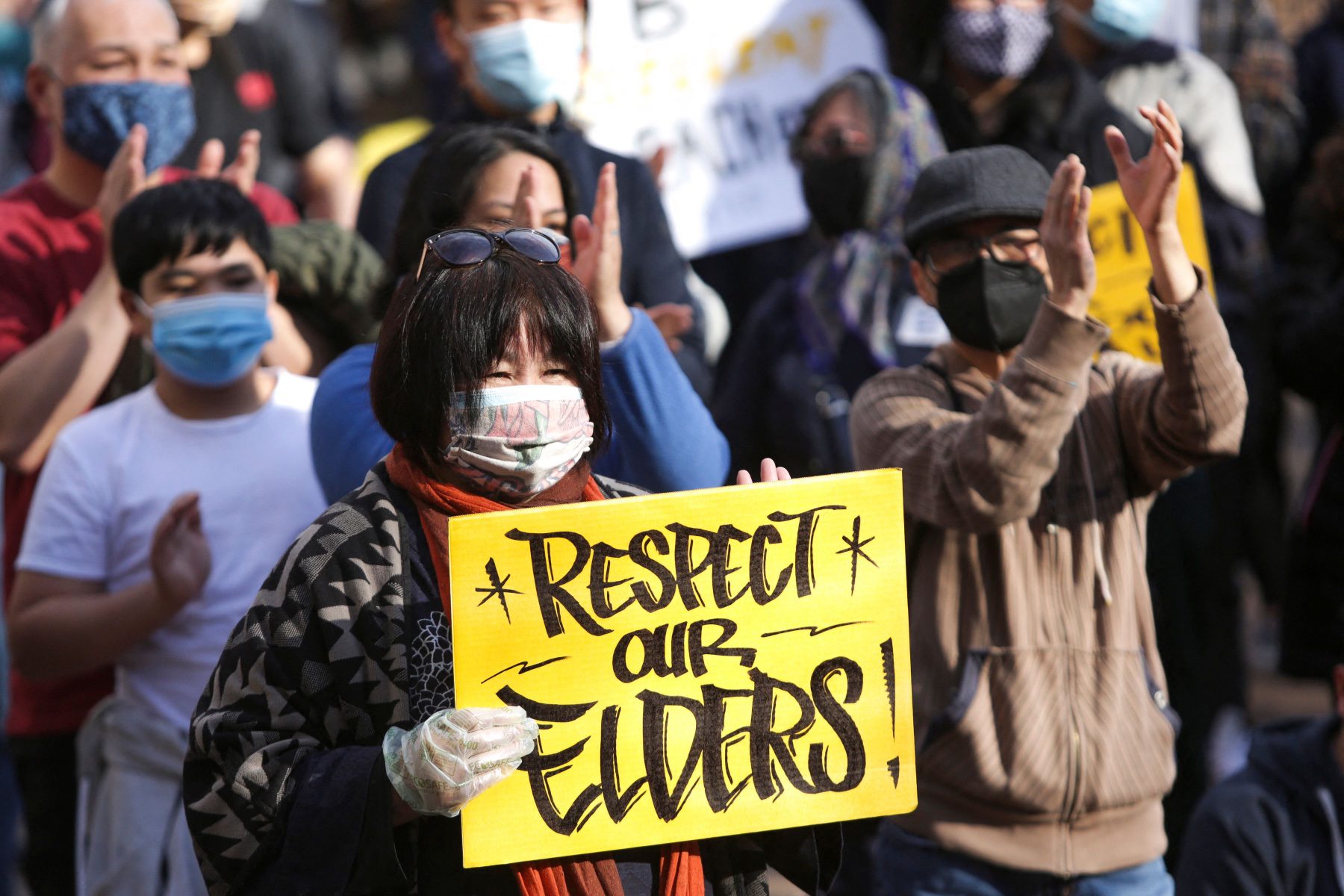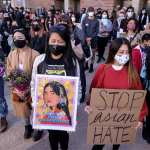Violent attacks against Asian Americans and Pacific Islanders coincided with the start of the pandemic, and although media attention has waned, reports haven’t stopped.
And Asian American and Pacific Islander (AAPI) advocacy groups are worried that the COVID-19 origin report, released Friday by the Office of the Director of National Intelligence, may drive a new rise in attacks against the community, especially against women and older people who are seen as more vulnerable targets. They also fear officials may not take victims’ reports seriously unless people are speaking out regularly and emphatically.
The report’s inconclusive results come after scientists involved in the research reportedly said that time is running out to find reliable information on the virus’ origin — and as the White House continues to pin the lack of results on government officials in China not cooperating with investigations.
The potential blowback from this reminder of the virus’ roots in China, and the difficulty investigators have had with obtaining information, is what the AAPI groups are bracing for.
“We wanted our communities to be prepared,” said Sonal Shah, president of the Asian American Foundation, explaining why the recently formed philanthropic group released a toolkit last week. The kit encourages victims of hate crimes or similar incidents to call for help in the moment, write down details later and file a police report. It also encourages people to seek legal representation if necessary.
SurveyMonkey data cited by the Asian American Foundation’s toolkit found that a majority of Asian Americans are worried about being attacked again or bringing unwanted attention to their family if they report a hate crime.
Reported physical assaults against AAPI people, mostly adults and seniors, have increased by nearly 6 percent since last year, according to data released this month by the advocacy group Stop AAPI Hate. Reports of vandalism and online hate have also increased, while verbal harassment has decreased compared to 2020.
Yushu Fu, who moved to the United States from China 10 years ago, told The 19th that after the pandemic started — and as former President Donald Trump frequently referred to the coronavirus “the Chinese virus” and “Kung-flu” — she felt like she was being held responsible for a crisis that she had nothing to do with.
“You kind of feel like you got a little shorter,” said Fu, who lives in Delaware and now holds U.S. citizenship. “I remember when I go to the store I would always put a hat on and a mask.” Either consciously or unconsciously, she said, she just wanted to cover herself up.
Fu said that her father-in-law, who is White, eventually advised her last year not to go anywhere by herself — or to take her son, who is now 3 years old, out alone.
“That kind of put a weight on me,” she said. “I realized, okay, it’s not just in my head.”
Stop AAPI Hate has received as many reports of hate incidents in the first six months of 2021 as it did in the last nine months of 2020, it said in a letter to the White House earlier this month. And Asian-American women are still reporting the bulk of the hate incidents, according to the group’s data. Women reported 63.3% of the incidents tracked from March last year through August. The organization has said it does not independently verify each report.
Data released by the National Asian Pacific American Women’s Forum (NAPAWF) this month found that 70 percent of polled AAPI women 50 and older said that racism and hate had impacted their lives in some way.
Drishti Pillai, research manager at NAPAWF, said that while the Biden administration has helped shift the tone away from the Trump years by condemning attacks against the community, more can still be done.
“Staying silent isn’t enough, you have to actively condemn these acts of hate and make sure that people understand that AAPIs, we are still American, we are as much American as anyone else,” she said.
Shah stressed that AAPI people who experience a hate incident should report it so the scope of the situation can be shown to local officials.
Bystanders should also help victims report incidents, she said, and speak up.
“If it’s not happening to us doesn’t mean that it’s not our problem,” she said. “Because when it does happen to us, we want somebody to speak up for us, too.”
One reason TAAF released the toolkit, Shah said, was because it was important to remind officials and the news media not to play down the attacks.
Jason Wu, co-chair of GAPIMNY-Empowering Queer & Trans Asian Pacific Islanders, said that systemic change is needed to address the violence faced by AAPI people — and discrimination faced by the community as a whole.
“Policing, hate crimes prosecutions, none of that provides more resources or support for our communities, none of that actually changes anything systemically,” he said.
He is also worried about a spike in hate incidents, but added: “I’m always worried. None of this is new … anti-Asian attacks are only one part of it.”
-
More from The 19th
- House passes hate crimes bill after year of increased violence against Asian Americans
- ‘Never being American enough:’ Asian women on living in a country that feels increasingly unsafe
- How Sens. Mazie Hirono and Susan Collins worked across the aisle to pass a bill on anti-AAPI hate crimes
“The violation of Asian women is embedded in American history and culture,” Xoai Pham, a trans Vietnamese American writer, wrote this spring in an Esquire magazine story that Wu pointed to.
“Asian women are seen as inherently violable—whether we’re cisgender or transgender women only determines the degree of violation,” Pham wrote.
In Delaware, Fu started speaking out not just because of the atmosphere of fear, but because of how her local leaders seemed to perceive people of Asian descent.
Fu organized Delaware Asian American Voice after Democratic state Rep. Gerald Brady admitted to using a racial slur to refer to Asian women — and characterizing them as sex workers through a deragatory description — from his government email address. Brady apologized and is not seeking reelection, but that is not enough for everyone. Liz Shuler, president of the AFL-CIO, called for Brady’s resignation from his local executive director position within the labor union on Friday.
Fu said that Brady’s email and her interactions with local lawmakers as she lobbied for his ouster made her feel that her hope earlier in the pandemic — that politicians and media were taking discrimination against AAPIs seriously — was naive.
“Tactics like this do not ingratiate you to anyone who could help your cause,” Delaware state Rep. Eric Morrison, a progressive Democrat, wrote in a public Facebook comment to Fu after a July town hall meeting.
Like many people of Asian descent, Fu over the years has felt she experienced microaggressions at her job and felt stifled by stereotypes that Asian women are expected to not make waves or be angry. These experiences didn’t bother her as much until she became a mom, she added. Now, when taking her son to the neighborhood playground she tries to avoid eye contact with people who appear to have a problem with her.
“I’m thinking about, my kid is going to grow up here and experience all the discrimination,” she said. “It hurts me in a different way. … It’s very upsetting for me to think about, one day my son will be old enough to realize what this is and how he is going to take it.”
Pillai said policymakers should start caring about the rise in anti-AAPI violence — and about the political power of Asian American women.
Nearly 80 percent of AAPI women 50 years and older surveyed by NAPAWF said they voted in the 2020 election — and a majority also voted in congressional elections and governors’ races, Pillai pointed out. Asian Americans are also the fastest-growing racial or ethnic group in the country.
“It is important to understand that these stories and these voices can no longer be ignored,” she said.
Disclosure: The Asian American Foundation has been a financial supporter of The 19th.







